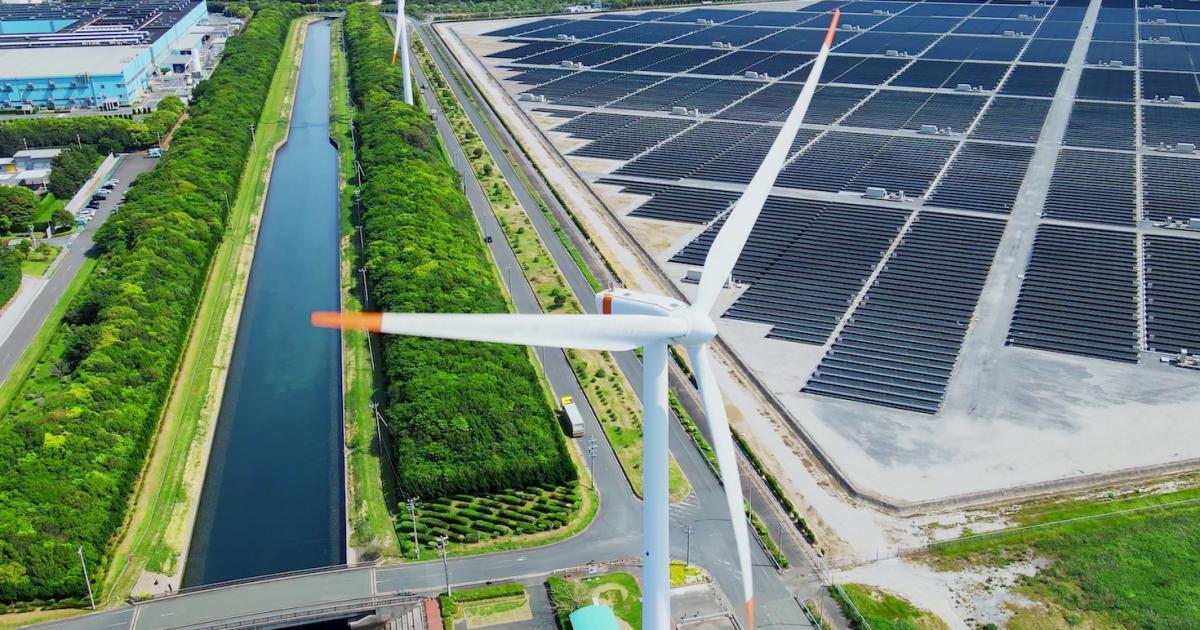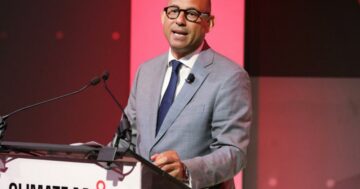
A suite of “doable today” business actions that would slash demand for energy could unlock annual savings of at least $2 trillion a year across the global economy, while helping to boost growth, save companies cash, unlock competitive advantages and reduce greenhouse gas emissions.
That is the conclusion of major new research backed by over 120 CEOs of global corporates, which sets out a host of near-term actions businesses can take to reduce energy demand across their buildings, infrastructure and transport use.
Drawn up by consulting giant PwC in collaboration with the World Economic Forum (WEF), the research contends that if cost effective energy efficiency measures were taken by companies by the end of the current decade, and better supported by effective policy frameworks, it could unlock a major acceleration in the net zero transition.
The research, which comes ahead of next week’s annual global WEF meeting in Davos, Switzerland, argues “the potential of demand-side action is extraordinary,”and details a host of measures it claims are “doable today, at attractive returns with no need for new technology.”
Recommended measures include retrofitting buildings with insulation and other efficiency and green energy measures, electrifying transport systems and harnessing artificial intelligence to optimize factory-line design to unlock efficiencies. The report also recommends deeper collaboration between businesses across value chains in order to unlock further efficiencies, as well as “industrial clustering” to share clean energy sources and maximize the benefits of efficiency initiatives.
The research argues energy efficiency measures remain an “under-addressed” component of the net zero transition, which can deliver substantial energy and emissions savings.
It claims proven measures could deliver a short-term, cost-efficient reduction in energy demand of almost a third — 31 percent — shared across the buildings, industry and transport sectors, and avoid the need to construct almost 3,000 extra power stations.
Moreover, these efforts would support the UAE Consensus agreed at COP28 in Dubai last month, which saw hundreds of nations commit to tripling renewable energy capacity and doubling the rate of energy efficiency improvements worldwide by 2030.
However, in order to deliver on these global ambitions countries need to cut their energy intensity at least twice as fast between 2023 and the end of the decade compared to previous.
“It is crucial we address energy demand alongside supply, reducing the energy intensity of current activity and increasing the energy efficiency of future growth,” said PwC’s global chair, Bob Moritz. “This will help the world to get back on track on targets set out in the Paris Agreement, support the COP28 pledge to double the rate of energy efficiency improvements by 2030, and support business growth. Getting this right will take deep collaboration across the public and private sectors. We need to raise awareness of the business case for change, align policy and private incentives, and develop new financial solutions to unlock action.”
The 120 CEOs supporting the findings are responsible for an estimated 3 percent of global energy use. They are members of the WEF’s International Business Council which met in Davos a year ago to discuss the potential for demand-side measures to accelerate the clean energy transition, it explained.
But the report warns that awareness among companies of the potential for energy efficiency to benefit their business, achieve cost savings and support emissions reduction efforts remains low, as it called for more supportive government policy to help drive progress.
As many as 47 percent of CEOs on the WEF’s International Business Council surveyed for the report cited a lack of supportive regulation as a barrier to effort to reduce energy demand.
Chair of the Council Ana Botín, group executive chair at Spanish banking giant Santander, said businesses had a “vital role to play” in slashing energy demand worldwide, and stressed that firms could do so without decreasing economic output.
“Reducing the amount of energy needed to manufacture products and deliver services is something we can act on now,” she said. “Although progress is being made, there is a lot more to be done, and the fact is that our energy demand continues to rise at unsustainable rates.
“It is crucial, therefore, that we work together with governments and regulators across both developed and developing markets to help accelerate progress on this issue.”
- SEO Powered Content & PR Distribution. Get Amplified Today.
- PlatoData.Network Vertical Generative Ai. Empower Yourself. Access Here.
- PlatoAiStream. Web3 Intelligence. Knowledge Amplified. Access Here.
- PlatoESG. Carbon, CleanTech, Energy, Environment, Solar, Waste Management. Access Here.
- PlatoHealth. Biotech and Clinical Trials Intelligence. Access Here.
- Source: https://www.greenbiz.com/article/business-action-energy-efficiency-could-save-2-trillion-year-new-research-claims
- :is
- $UP
- 000
- 120
- 2023
- 2030
- 31
- a
- accelerate
- acceleration
- Achieve
- across
- Act
- Action
- actions
- activity
- address
- advantages
- ago
- agreed
- Agreement
- ahead
- align
- almost
- alongside
- also
- Although
- ambitions
- among
- amount
- an
- Ana
- and
- annual
- ARE
- Argues
- artificial
- artificial intelligence
- AS
- At
- attractive
- avoid
- awareness
- back
- back on track
- backed
- Banking
- barrier
- BE
- being
- benefit
- benefits
- Better
- between
- bob
- boost
- both
- buildings
- business
- businesses
- by
- called
- CAN
- Capacity
- case
- Cash
- CEOs
- chains
- Chair
- change
- cited
- claims
- clean
- clean energy
- clustering
- collaboration
- comes
- commit
- Companies
- compared
- competitive
- component
- conclusion
- Consensus
- construct
- consulting
- continues
- cop28
- corporates
- Cost
- cost savings
- could
- Council
- countries
- crucial
- Current
- Cut
- davos
- decade
- decreasing
- deep
- deeper
- deliver
- Demand
- Design
- details
- develop
- developed
- developing
- discuss
- do
- done
- double
- doubling
- drive
- Dubai
- Economic
- Economic Forum
- economy
- Effective
- efficiencies
- efficiency
- effort
- efforts
- electrifying
- Emissions
- end
- energy
- energy efficiency
- energy use
- estimated
- Ether (ETH)
- executive
- explained
- extra
- extraordinary
- fact
- FAST
- financial
- findings
- firms
- For
- Forum
- frameworks
- further
- future
- future growth
- GAS
- get
- getting
- giant
- Global
- Global economy
- Government
- Government policy
- Governments
- Green
- green energy
- greenhouse gas
- Greenhouse gas emissions
- Group
- Growth
- had
- Harnessing
- help
- helping
- host
- HTTPS
- Hundreds
- if
- improvements
- in
- Incentives
- include
- increasing
- industrial
- industry
- Infrastructure
- initiatives
- Intelligence
- International
- international business
- issue
- IT
- jpg
- Lack
- Last
- least
- Lot
- Low
- made
- major
- many
- Markets
- Maximize
- measures
- meeting
- Members
- met
- Month
- more
- Nations
- Need
- needed
- net
- New
- next
- next week
- no
- now
- of
- on
- Optimize
- order
- Other
- our
- out
- output
- over
- paris
- Paris Agreement
- percent
- plato
- Plato Data Intelligence
- PlatoData
- Play
- Pledge
- policy
- potential
- power
- previous
- private
- Products
- Progress
- proven
- public
- PWC
- raise
- Rate
- Rates
- recommends
- reduce
- reducing
- reduction
- Regulation
- Regulators
- remain
- remains
- Renewable
- renewable energy
- report
- research
- responsible
- returns
- right
- Rise
- Role
- s
- Said
- Santander
- Save
- Savings
- saw
- Sectors
- Services
- set
- Sets
- Share
- shared
- she
- short-term
- slashing
- So
- Solutions
- something
- Sources
- Spanish
- Stations
- substantial
- suite
- supply
- support
- Supported
- Supporting
- supportive
- surveyed
- switzerland
- Systems
- Take
- taken
- targets
- Technology
- that
- The
- the world
- their
- There.
- therefore
- These
- they
- Third
- this
- to
- today
- together
- track
- transition
- transport
- Trillion
- tripling
- Twice
- UAE
- unlock
- unsustainable
- use
- value
- vital
- Warns
- we
- week
- WEF
- WELL
- were
- which
- while
- will
- with
- without
- Work
- work together
- world
- World Economic Forum
- World Economic Forum (WEF)
- worldwide
- would
- year
- zephyrnet
- zero











